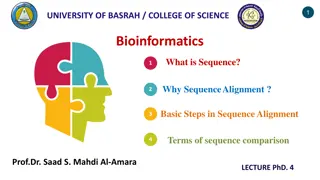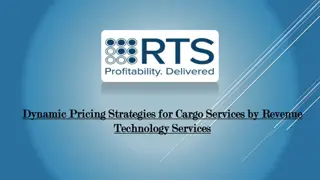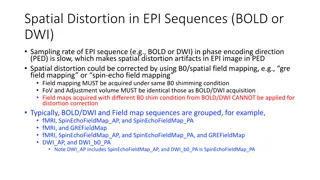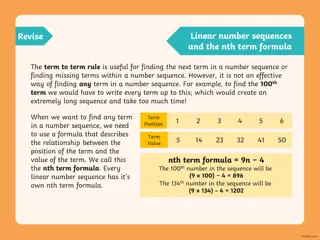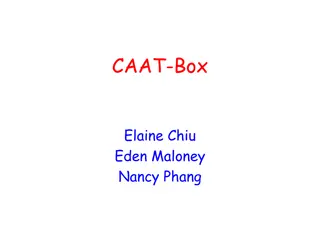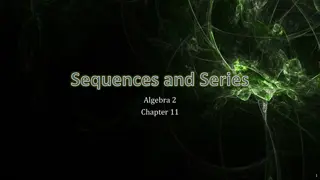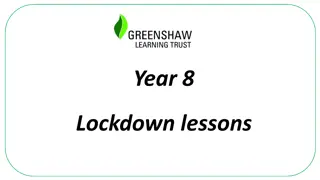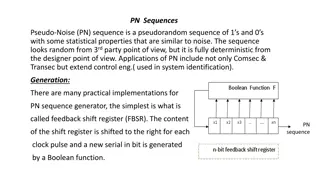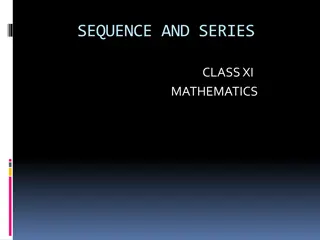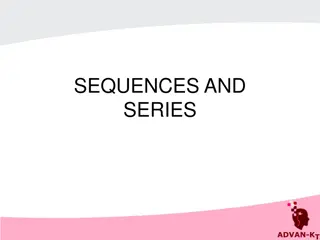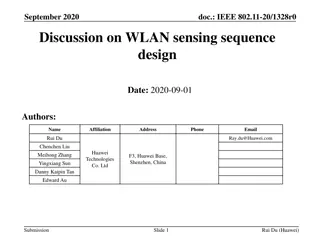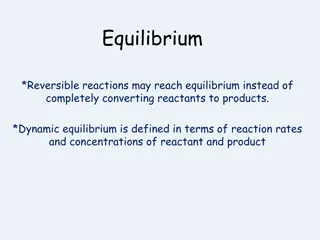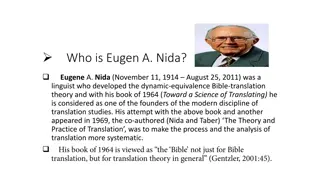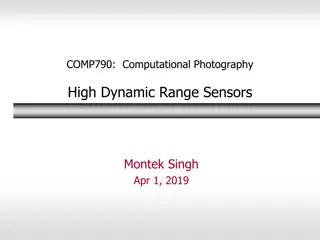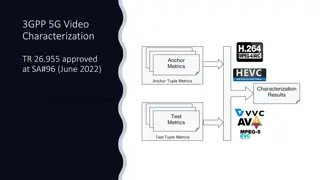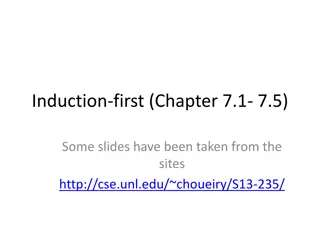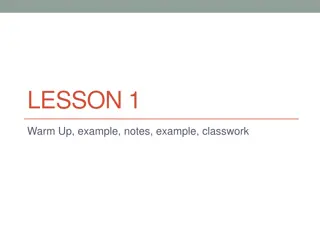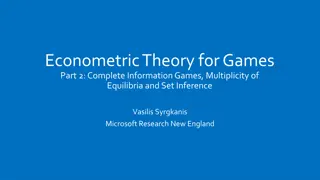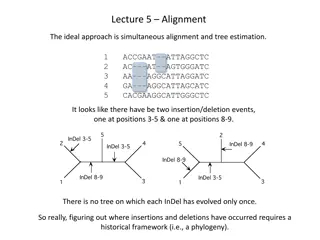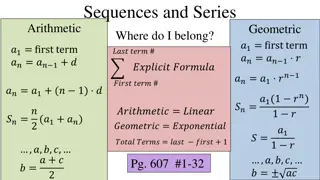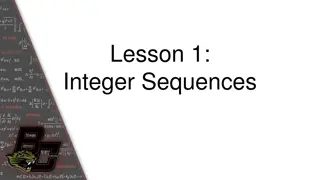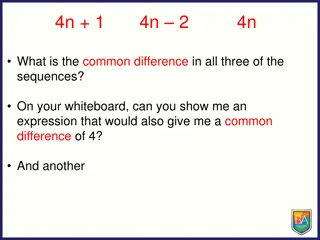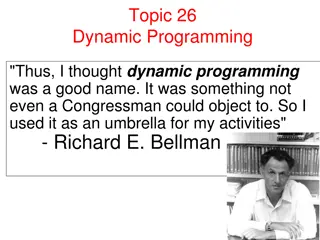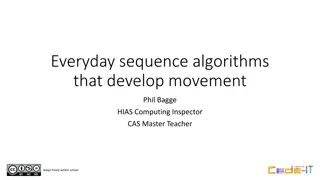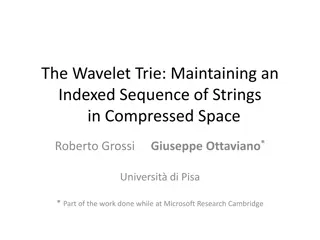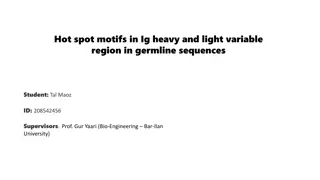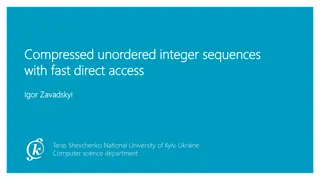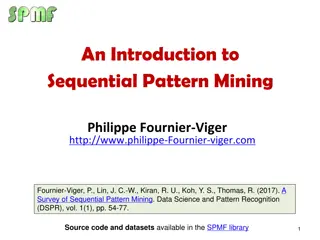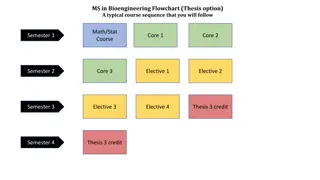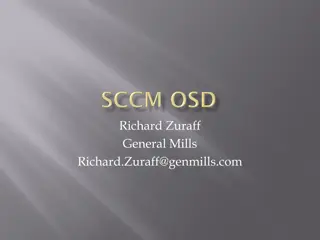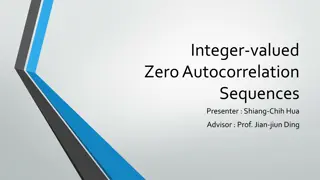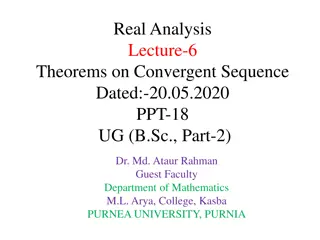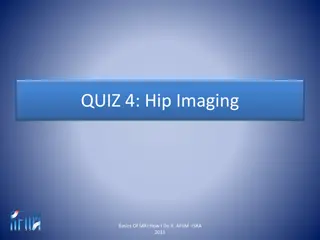Bioinformatics
Bioinformatics involves analyzing biological sequences through sequence alignment to uncover functional, structural, and evolutionary insights. This process helps in tasks like annotation of sequences, modeling protein structures, and analyzing gene expression experiments. Basic steps include compar
0 views • 6 slides
Dynamic Pricing Strategies for Cargo Services by Revenue Technology Services
In today's fast-paced and competitive logistics industry, dynamic pricing has emerged as a pivotal strategy for maximizing revenue and improving efficiency. Revenue Technology Services (RTS), a leading provider of advanced cargo solutions, leverages dynamic pricing to optimize cargo service offering
1 views • 6 slides
Spatial Distortion Correction in EPI Sequences: Field Mapping Examples
Spatial distortion artifacts in EPI sequences (BOLD or DWI) due to slow sampling rates in the phase encoding direction can be corrected using B0/spatial field mapping techniques. This correction requires obtaining field maps under the same B0 shimming conditions and with identical FoV and adjustment
0 views • 4 slides
Understanding Linear Number Sequences and the Nth Term Formula
In mathematics, linear number sequences can be described using the nth term formula, which helps in predicting sequences and finding specific terms without generating the entire sequence. By understanding the relationship between term positions and values, one can efficiently determine any term with
1 views • 15 slides
Being a Dynamic Social Citizen: Start with Hello Week 2019-2020
Why is being a dynamic citizen important? Learn how connectedness can positively impact behavior and success in school. Explore key definitions like "Connectedness," "Dynamic," "Social Citizen," and "Inclusive," and discover a three-step guide on becoming a dynamic citizen by recognizing when peers
1 views • 17 slides
Understanding Transcription Factors and Regulatory Sequences in Gene Expression
Transcription factors play a crucial role in gene expression by controlling the recruitment of RNA polymerase. Promoter regions contain sequences like CAAT box and TATA box that regulate transcription by binding proteins. Consensus sequences are conserved patterns in the genome with various biologic
2 views • 10 slides
Understanding Sequences and Series in Algebra 2
Dive into the concept of sequences and series in Algebra 2 with examples and diagrams from the Big Ideas Algebra 2 textbook by Larson, R., and Boswell (2022). Explore the progression of values and patterns in sequences, and learn about the sum of series to enhance your understanding of this fundamen
1 views • 58 slides
Dynamic Memory Allocation in Computer Systems: An Overview
Dynamic memory allocation in computer systems involves the acquisition of virtual memory at runtime for data structures whose size is only known at runtime. This process is managed by dynamic memory allocators, such as malloc, to handle memory invisible to user code, application kernels, and virtual
0 views • 70 slides
Mastering Sequences in Mathematics
Delve into the world of mathematical sequences with this comprehensive guide. Explore what sequences are, different types like arithmetic and geometric, rules for continuing sequences, methods to find specific terms, and understanding position-to-term rules to solve for nth terms efficiently.
0 views • 17 slides
Understanding Pseudo-Noise Sequences and Applications
Pseudo-Noise (PN) sequences are deterministic yet appear random, with applications in various fields such as communication security, control engineering, and system identification. Generated using shift registers, they exhibit statistical properties akin to noise. Linear and nonlinear feedback shift
1 views • 19 slides
Understanding Sequences and Series in Mathematics
Sequences and series are fundamental concepts in mathematics, with sequences consisting of terms denoted as a1, a2, a3, ... and series involving the sum of terms in arithmetic and geometric progressions. Learn about arithmetic progression, geometric progression, terms, and formulas for finding sums
1 views • 11 slides
Understanding Sequences and Series
Exploring the concepts of sequences and series in mathematics, including definitions, examples, and exercises on arithmetic sequences, geometric progressions, and general terms. Learn about generating sequences, finding nth terms, common differences, and common ratios in different types of sequences
0 views • 20 slides
Discussion on WLAN Sensing Sequence Design in IEEE 802.11-20/1328r0
This presentation by Rui Du from Huawei discusses the design of sequences for WLAN sensing in IEEE 802.11 standards. It covers topics such as existing sequences, analysis of sequences, ambiguity functions, Golay sequences, and properties adopted for communication sequence design.
4 views • 14 slides
Understanding Dynamic Equilibrium in Chemical Reactions
Explanation of reversible reactions, dynamic equilibrium, and the characteristics of equilibrium in chemical systems. Covers the concept of reversible reactions, dynamic equilibrium, rules for dynamic equilibrium, and examples to illustrate these concepts visually.
0 views • 54 slides
Eugene A. Nida - Pioneer of Dynamic Equivalence Bible Translation Theory
Eugene A. Nida (1914-2011) was a linguist who revolutionized Bible translation theory with his concept of dynamic equivalence. Through works like "Toward a Science of Translating," he shaped modern translation studies. Nida's theory distinguishes between formal and dynamic equivalence, favoring the
0 views • 10 slides
Understanding High Dynamic Range Sensors in Computational Photography
Dive into the world of High Dynamic Range (HDR) sensors in computational photography with topics covering sensor architectures, CMOS sensing techniques, dynamic range evaluation, and basic concepts related to image sensors and pixel integrators. Explore the importance of dynamic range in capturing a
6 views • 33 slides
5G Video Characterization: Reference Sequences and Metrics
Scenarios and anchor generation for various video codecs used in 5G services are detailed, along with reference sequences for different applications like Full HD streaming, 4K-TV, screen content, and more. Tools and repositories for accessing reference sequences are provided, and metrics for evaluat
0 views • 15 slides
Understanding Sequences in Mathematics
Explore arithmetic, geometric, and Fibonacci sequences along with their general forms and properties. Learn how to define sequences and terms, and understand the concepts of indices and common differences/common ratios.
0 views • 51 slides
Sequences and Patterns in Mathematics
Dive into the world of sequences and patterns with examples and exercises involving identifying patterns, writing formulas, and graphing terms on coordinate planes. Explore different scenarios and learn to express nth terms in sequences. Understand the importance of indexing terms and using proper f
0 views • 48 slides
Econometric Theory for Games: Complete Information, Equilibria, and Set Inference
This tutorial series discusses econometric theory for games, covering estimation in static games, Markovian dynamic games, complete information games, auction games, algorithmic game theory, and mechanism design. It explores topics like multiplicity of equilibria, set inference, and mechanism design
1 views • 23 slides
Interactive Role-Shifting Narrative Sequences
Explore a collection of interactive narrative sequences focusing on role-shifting scenarios, falls, and trip/fall sequences. Discover various story elements like location descriptions, object passing, outcomes, and reactions. Engage with different scenarios to enhance storytelling skills and creativ
0 views • 17 slides
Understanding Equivalent Ratios and Linear Sequences for Problem Solving
Learn how to identify and work with equivalent ratios, spot linear sequences, and solve problems using ratios. Practice simplifying ratios, correcting work, and applying ratios in real-life scenarios. Explore scenarios like sharing sweets between Alice and Bert to strengthen your understanding of ra
0 views • 19 slides
Progressive Alignment Overview in Phylogenetics
In the field of phylogenetics, the process of progressive alignment is crucial for aligning sequences and building evolutionary trees. This approach involves generating pairwise alignments, estimating distances, constructing guide trees, and aligning sequences progressively based on the tree. Needle
0 views • 12 slides
Exploring Sequences and Series in Mathematics
Delve into the world of sequences and series, understanding the concepts of arithmetic and geometric progressions. Learn to identify finite and infinite sequences, explore various patterns, and model them mathematically. From arithmetic to geometric, finite to infinite, this content offers a compreh
0 views • 52 slides
Understanding Integer Sequences and Terms
Explore the concepts of integer sequences, including infinite and finite sequences, terms of a sequence, and nth term formulas. Learn to classify sequences as finite or infinite and find specific terms in a sequence. Gain a comprehensive understanding of notation and terminology used for describing
3 views • 23 slides
Exploring Juggling Patterns and Sequences
Dive into the world of juggling with a detailed exploration of basic juggling patterns and sequences. Learn about the rules and rhythms that dictate juggling movements, including cascade and fountain patterns. Discover how variations in throw heights can change the dynamics of juggling sequences. Ex
0 views • 41 slides
Exploring Sequences and Patterns in Mathematics
Dive into the world of sequences and patterns by exploring expressions, common differences, and nth terms. Discover how to create sequences with specific common differences, identify terms within sequences, and use Venn diagrams to visualize different scenarios. Uncover the rules for constructing nt
0 views • 13 slides
Understanding Dynamic Programming through Richard Bellman's Insights
Dynamic Programming, as coined by mathematician Richard Bellman in the 1950s, is a powerful method for solving complex problems by breaking them into smaller sub-problems. Bellman's innovative approach has had a significant impact on various fields. This article explores the origins, principles, and
0 views • 38 slides
Everyday Movement Sequences for Physical Computing Activities
Explore a series of everyday movement algorithms designed to enhance physical computing skills. Develop your own sequences and follow along with various movements like standing, waving, bowing, jumping, spinning, and more. From basic movements to more complex actions, adapt and freely incorporate th
0 views • 11 slides
Efficient Maintenance of Indexed String Sequences in Compressed Space
The Wavelet Trie, Prefix Operations, and Dynamic Sequences are explored in maintaining an indexed sequence of strings efficiently. Various operations like access, rank, select, and dynamic updates are discussed with the aim of storing strings in minimal space while supporting polylog operations effe
0 views • 20 slides
Understanding Sequences in Database Management Systems
Sequences in a database are objects that generate unique numeric values automatically. They can be used to create primary key values and improve query performance. By defining sequences using the CREATE SEQUENCE statement in SQL, you can control the generation of sequential numbers with options like
0 views • 41 slides
Hot Spot Motifs in Ig Heavy and Light Variable Region Sequences
B cells express unique receptors to combat pathogens, with membrane-bound immunoglobulins forming their diverse repertoire. The regions of high variance, known as CDRs, play a crucial role in antigen binding. Ig genes contribute significantly to immune function, with recent studies revealing genetic
0 views • 13 slides
Advanced Compression Techniques in Unordered Integer Sequences
Presenting innovative methods for compressing and accessing unordered integer sequences efficiently. Explore fast element extraction and direct addressable variable-length codes to optimize memory usage and enhance data handling. Cutting-edge research from top universities and workshops is showcased
0 views • 8 slides
Introduction to Sequential Pattern Mining Overview
Discover the concept of sequential pattern mining, a popular data mining task introduced in 1994, with a focus on analyzing discrete sequences to find interesting patterns. Sequential pattern mining involves finding frequent subsequences in sets of discrete sequences, such as items purchased by cust
1 views • 24 slides
Typical Course Sequences in Bioengineering and Engineering Master's Programs
These flowcharts illustrate the typical course sequences for both thesis and non-thesis options in MS in Bioengineering, MD/E programs, and Master of Engineering degree. The sequences include core courses, electives, project courses, and thesis credits spread across semesters. Each program offers a
0 views • 5 slides
Optimizing SCCM Deployment Process With Task Sequences and Image Management
Explore the efficient utilization of SCCM task sequences, image packages, and deployment methods to streamline the deployment process. Learn about custom task sequences, software imaging strategies, and driver import considerations for successful deployments in an enterprise environment.
0 views • 21 slides
Understanding Integer-Valued Zero Autocorrelation Sequences
Delve into the realm of integer-valued zero autocorrelation sequences, exploring concepts like periodic sequences, frequency domains, constant amplitudes, and more. Unravel the methods and techniques involved in creating these sequences and their significance in various applications.
0 views • 32 slides
Theorems on Convergent Sequences with Proofs and Examples
The lecture covers theorems on convergent sequences, including the convergence of monotonic increasing and decreasing sequences when bounded. Detailed proofs for these theorems are provided, along with examples to determine if a sequence is bounded. The presentation includes step-by-step explanation
0 views • 6 slides
Understanding Dynamic Loading and Linking in Memory Management
This presentation covers the concepts of dynamic loading and linking in memory management, discussing how programs and data are managed in physical memory, the advantages of dynamic loading, and the process of dynamic linking for system language libraries. The use of stubs for locating memory-reside
0 views • 12 slides
Hip Imaging Basics: MRI Techniques and Sequences for Bilateral Examination
This content presents a quiz on hip imaging basics focusing on MRI techniques and sequences for bilateral examination. It covers topics such as appropriate positioning, the use of Propeller sequences, and the best choice of sequence for labral arthro-MR study. Images and questions related to hip ima
0 views • 15 slides
